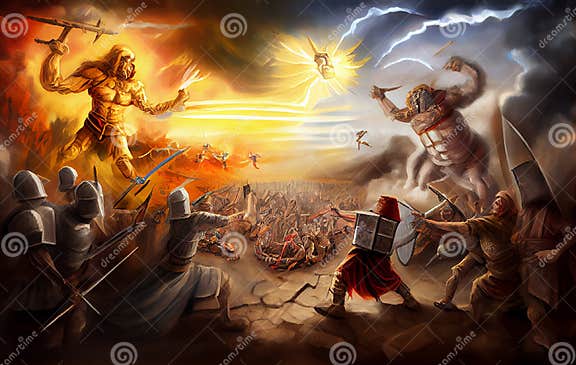The concept of the Battle of Armageddon, as contextualized within Bahá’í teachings, presents a transformative perspective on eschatology, diverging significantly from traditional interpretations prevalent in many religious doctrines. This new revelation embodies a holistic understanding of human civilization’s spiritual evolution, emphasizing unity rather than conflict. In examining these teachings, one crafts a narrative that intertwines prophecy with a call to action for individuals and communities to seek harmony in a tumultuous world.
To begin, the term “Armageddon” has its roots in the Christian tradition, often depicting a climactic battle between forces of good and evil. This imagery has invoked fear and anticipation for millennia, often suggesting a literal confrontation leading to the end of the world. However, the Bahá’í perspective invites adherents to reinterpret this concept within a broader, metaphorical framework. Rather than a physical battleground, Armageddon represents a pivotal juncture in humanity’s moral evolution, a struggle between divisive forces and the imperative for unity.
The Bahá’í teachings assert that humanity is currently immersed in a dualistic conflict, marked by polarization and disunity. This dichotomy is accentuated by cultural, religious, and ideological differences that impede collective progress. To navigate this discord, Bahá’u’lláh, the founder of the Bahá’í Faith, offers a new lens through which to view the “battle” of our times: the endeavor to transcend these divisions through the recognition of our shared humanity.
Central to Bahá’í belief is the concept of progressive revelation, wherein each divine messenger articulates the needs and conditions of their time. This continual unfolding of truth enables humanity to comprehend spiritual teachings at a deeper level. Just as past revelations have sought to unify and rekindle the human spirit, the teachings of Bahá’u’lláh emerge as a resounding call for collective action in the face of modern challenges. They compel individuals to reimagine spiritual warfare as an inner struggle against ignorance, prejudice, and hatred.
The Bahá’í writings elucidate that this period, often termed the “Most Great Separation,” reflects humanity’s estrangement from the divine essence that once unified it. This metaphorical battle ultimately underscores the importance of personal transformation and social responsibility. Each individual’s efforts in fostering peace and understanding directly contribute to the larger narrative of human development.
Moreover, Bahá’í texts, such as the “Book of Certitude,” expound on the interconnectedness of all religious systems. This doctrine posits that the world’s faiths are not disparate but rather pieces of a grand puzzle contributing to a coherent cosmic design. By embracing this realization, believers can transcend the narrow confines of sectarianism, fostering a more inclusive communal identity that resonates with the genuine principles shared across diverse spiritual paths.
The promise inherent in Bahá’í teachings lies in the assurance that humanity is on the cusp of profound transformation. The Battle of Armageddon reinterpreted thus signifies not a cataclysmic end, but instead, a crescendo toward a new dawn. It is a manifestation of humanity’s collective struggle to embody values such as justice, compassion, and cooperation. This promise should incite curiosity and motivation, drawing individuals to engage in dialogue and cooperation towards a common good.
As the world grapples with unprecedented challenges—climate change, social injustice, and widespread conflict—the urgent need for a unified approach becomes glaringly evident. The Bahá’í teachings encourage a pivotal shift: rather than perceiving these crises as insurmountable, one could view them as opportunities for growth and transformation. The real battle, therefore, is against despair and paralysis; recognizing the potential for positive change requires an unwavering commitment to uplift the collective spirit of humanity.
Furthermore, the notion of the Battle of Armageddon, as envisioned by Bahá’í tenets, invites exploration into the symbiotic relationship between personal realization and societal advancement. Each individual’s journey toward enlightenment contributes significantly to the broader aspiration for a just and equitable society. In essence, spiritual awakening catalyzes societal progress—an idea echoed throughout the corridors of the Bahá’í community.
In articulating a fresh vision of Armageddon, Bahá’í teachings emphasize collaboration among diverse peoples. The advent of global communication technologies has rendered geographical and cultural barriers increasingly porous, propelling humanity toward an unprecedented interconnectedness. Engaging with this reality compels individuals to reassess their roles as global citizens, encouraging a spirit of cooperation that transcends parochial concerns.
Another crucial aspect of this reinterpretation is the emphasis on education. Bahá’í teachings advocate for the education of all individuals—particularly women and marginalized communities—as imperative to mitigating the chaos that characterizes contemporary society. The empowerment through knowledge serves not only as a personal liberator but also as a catalyst for societal refinement. Thus, the battle envelops the struggle for enlightenment and empowerment, ultimately leading to a more harmonious existence.
In conclusion, the Bahá’í perspective on the Battle of Armageddon signifies a sweeping re-conceptualization of eschatological narratives. By transcending the traditional dichotomies of good versus evil, Bahá’í teachings champion unity as the cornerstone of human progress. As individuals engage with these insights, a paradigm shift unfolds, urging a collective embrace of shared aspirations. Such an understanding not only piques curiosity but fosters a steadfast commitment to a future forged in cooperation and love—underscoring the profound truth that humanity’s greatest battles might not be fought in isolation, but rather together as a unified collective.
